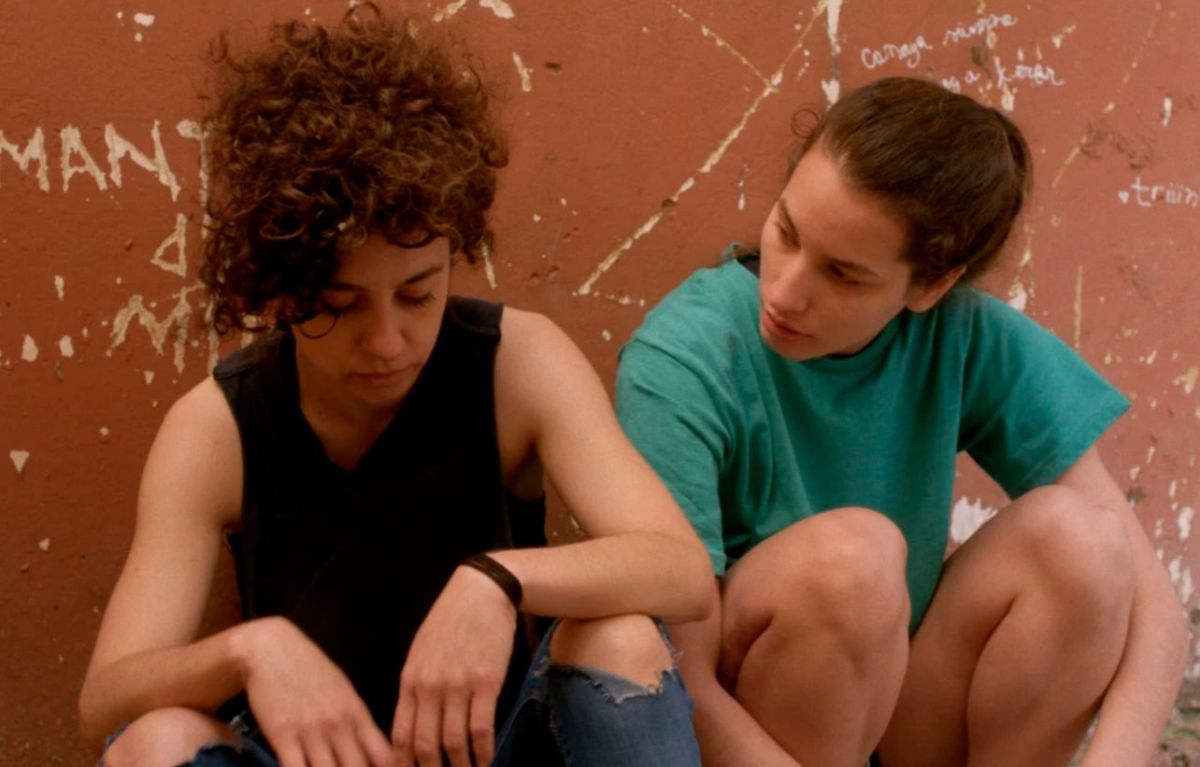All the teenagers in the barrio are horny. A rundown project characterised by prostitution, drug-dealing, unemployment and basketball, sexual desire runs high. In an early scene, a group of boys play hide-and-seek, mostly using the opportunity as an excuse to have sex. One girl, Iris (Sofía Cabrera), is amongst the group. When a boy tries to kiss her, she politely declines, as she has a crush on the mysterious Renata (Ana Carolina Garcia), who used to live in the area but left due to mysterious reasons.
With a bird’s-nest haircut, circular sunglasses and a short mini-skirt, the returning Renata exudes an exciting sexual energy, quite at odds with the square, sporty Iris, who always wears a basketball top. Iris writes a letter and gives it to her after meeting on the bus. They develop a quick relationship, later complicated by the rumours that swirl around Renata’s past.
In this neighbourhood, STD-panic pervades every scene, with both boys and girls worried about contracting chlamydia, herpes and, most significantly, HIV. Iris learns from her friends that Renata may have HIV herself, complicating her desire, and showing that prejudice exists within the queer community itself. This story of Iris and Renata interweaves with Iris’ two male cousins, who are also both gay, and figuring out how to express their homosexuality.
This isn’t your average film about LGBT struggle, whereby protagonists struggle against the simplistic forces of hatred, but something far more difficult for a straight person such as myself to navigate. There is plenty of talk about what “they” say, especially with regards to Renata’s past, yet we never really meet who “they” are, rendering them a kind of abstract force. Additionally, Iris’ family are never seen, while her cousin’s supportive mother is perfectly fine with her two gay children.
These choices are odd. While there may be some sense to keeping the threat out, it makes one wonder if there is any threat at all. This perpetual sense of absence is stressed by the mise en scène, with characters often wandering out of frame, leaving us to stare at the corner of buildings or through empty hallways. Here the use of absence doesn’t render the theme of prejudice stronger, it merely muddles it, making us wonder what exactly the prejudices are.
Thankfully the film is engaging enough on a simple formal level, even if its final thesis is unclear. Director Clarisa Navas eschews coverage in favour of lengthy one takes, the best of them simply tracking Iris and Renata as they walk around the neighbourhood and talk about themselves. These takes allow us to see them as they are in their environment, working best as an observational character piece. The performances from actresses Sofia Cebrera and Ana Carolina Garcia are accomplished; the former filled with searching anxiousness with the other projecting a strong tough-guy vibe that hides a wounded interior within. It’s a shame the meandering One In a Thousand cannot give them the platform they deserve.
Check out the rest of our Berlinale reviews here.
Some of the coverage you find on Cultured Vultures contains affiliate links, which provide us with small commissions based on purchases made from visiting our site.


